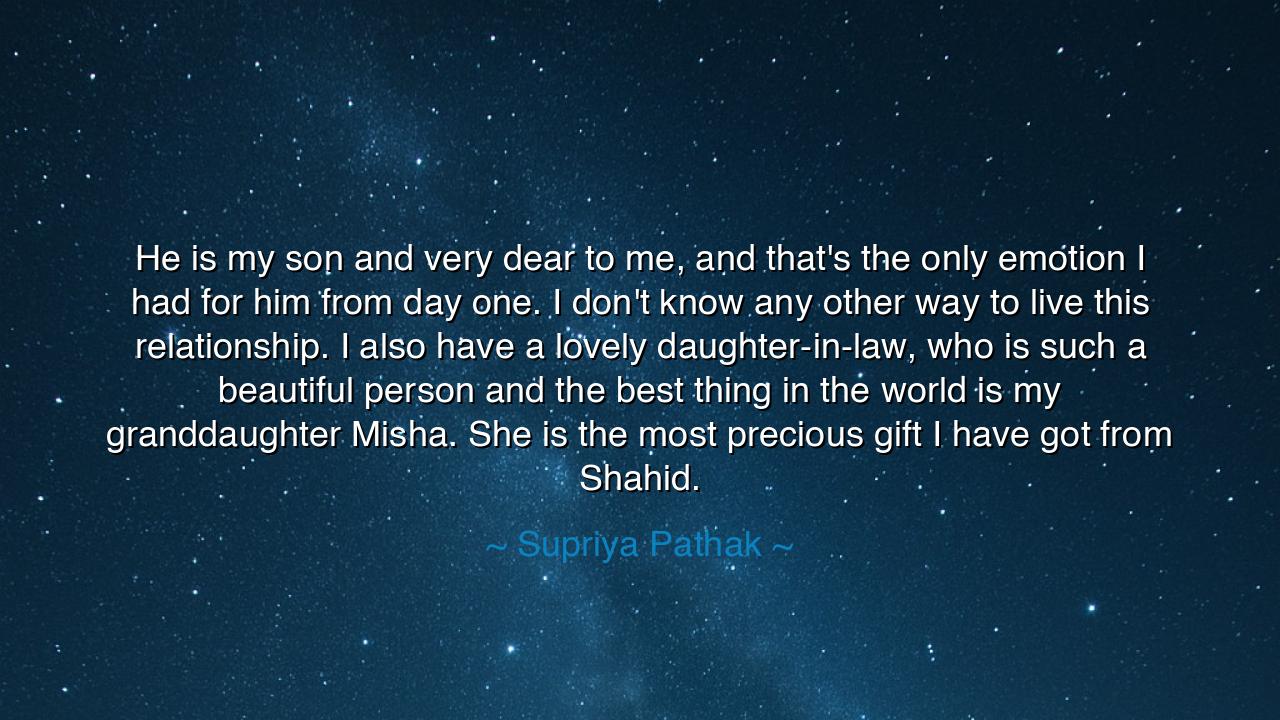
He is my son and very dear to me, and that's the only emotion I
He is my son and very dear to me, and that's the only emotion I had for him from day one. I don't know any other way to live this relationship. I also have a lovely daughter-in-law, who is such a beautiful person and the best thing in the world is my granddaughter Misha. She is the most precious gift I have got from Shahid.






When Supriya Pathak declares, “He is my son and very dear to me, and that’s the only emotion I had for him from day one. I don’t know any other way to live this relationship,” she speaks with the unshakable certainty of a mother’s heart. Her words embody the ancient truth that love for one’s child is not learned or acquired but instinctual, boundless, and eternal. In her declaration, she reminds us that parenthood is not merely a role but a sacred bond, forged from the first breath, the first touch, and the deepest part of the soul.
The origin of this truth lies in the very nature of life itself, where the birth of a child marks the beginning of a journey that transcends all logic and reason. From the first moment, the love a mother has for her child is pure, untainted by conditions or expectations. Pathak’s words evoke this ancient wisdom: that a mother’s love is not a choice but a calling, an instinct as old as the earth itself. It is a love that needs no justification, for it flows as naturally as water from a mountain stream.
As she speaks of her daughter-in-law and her granddaughter Misha, her heart expands further, embracing the fullness of family. Here, we see that the relationship between generations is not bound by blood alone but by the shared joy of seeing the next generation flourish. The mother’s love extends to those who bring joy to her child, for in them, she sees the fulfillment of her own labor of love. This is the sacred cycle of life: the love of the parent, passed down and transformed through the children, bringing light into the world with each passing day.
The mention of her granddaughter, the most precious gift, reveals a truth known to many elders: that the beauty of life is not merely in the work we do but in the legacy we leave. To see one’s child grow and then to witness the blossoming of a grandchild is to experience the eternal unfolding of love and connection. Each generation is a thread woven into the same fabric, and Pathak’s words remind us that the true wealth of life lies in the relationships we build, in the generations we nurture, and in the love that endures.
Let future generations understand: love is not a fleeting emotion but the eternal force that binds families together. As Pathak speaks of her son, her daughter-in-law, and her granddaughter, she teaches us that the most valuable treasures in life are not those we hold in our hands but those we carry in our hearts. Thus, her words stand as a testament to the power of familial love, which flows through generations, always growing, always expanding, always precious.






THNguyen Trung hieu
Supriya Pathak’s words remind me of the importance of family in shaping our lives. Her love for her son, daughter-in-law, and granddaughter seems to embody the ideal of unconditional love. But do you think it’s easy to maintain such clear emotions, or do challenges arise as family members grow and change? How can we cultivate the same type of pure affection and gratitude in our own relationships, especially as our families evolve over time?
QDtoan quy danh
I really admire how Supriya Pathak describes her relationship with her son and his family—so simple and pure. The love she expresses seems to come without complications or expectations. How can we learn to appreciate our loved ones with such clarity and joy, especially in today’s fast-paced world where relationships can sometimes feel strained or complex? What’s the secret to nurturing family bonds like the ones she describes?
JPGladys Janes Phantoms
Supriya Pathak's words are filled with warmth and affection for her family, and it’s heartwarming to see the clear appreciation she has for each member. Her mention of her granddaughter Misha as the 'most precious gift' especially stands out. Does becoming a grandparent shift how people view their relationships with their children? It seems like the bond with grandchildren might offer a new perspective on family dynamics and love.
NLNguyen Linh
Supriya Pathak’s quote reflects a deep sense of love and admiration for her family, especially her son, daughter-in-law, and granddaughter. It’s beautiful to see such straightforward, unconditional love expressed. But I wonder, does this type of emotional clarity come naturally to everyone, or does it take a conscious effort to build such a strong connection? How do you think relationships evolve with the addition of new family members, like a daughter-in-law or grandchild?